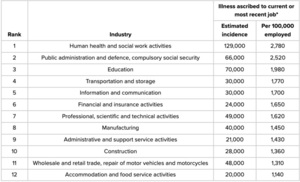
 |
Mark Sennett
Managing Editor |
 |
Kelly Rose
Editor |
| Home> | Health & Wellbeing | >General Health & Wellbeing | >Industries with highest workplace illness revealed |
Industries with highest workplace illness revealed
19 August 2025
RESEARCH HAS revealed that health and social care workers are the worst-affected by workplace illness, as a new government pilot scheme aims to address worrying annual sick note volumes.

The £1.5 million WorkWell pilot will see specialist staff placed in GP practices to help tackle the 11 million fit notes issued last year - 93% of which offered no guidance - by connecting patients with tailored support to stay in or return to work.
Health and Safety Executive (HSE) data reports 1.7 million cases of work-related illnesses in total annually, which cost UK businesses a staggering £14.5 billion each year.
The business finance experts at money.co.uk business savings have analysed the latest HSE data on workplace illness to identify the industries where businesses face the most significant challenges.
Industries with the highest rates of workplace illness:

*Three-year average of new cases (2021/22-2023/24) - industries with sample sizes marked as too small have been removed.
Topping the list is the human health and social work sector, with around 129,000 cases of work-related illness reported for workers’ current or most recent jobs, a rate of 2,780 per 100,000 workers (or about one in 35).
Roles in this sector are often physically and emotionally demanding, from providing care to managing complex human needs.
These figures highlight the importance of continued focus on wellbeing support, adequate staffing, and mental health resources for those on the front line of care and support.
Joe Phelan, money.co.uk business savings expert, comments: "With the daily pressures of running a business, it's easy to push savings down the priority list. However, this data is a stark reminder that a healthy contingency fund isn't a 'nice-to-have' – it’s crucial to protecting your people and your operations.
“By building a safety net, you’ll be better placed to support colleagues, while keeping the business running smoothly. Building up a contingency fund doesn’t have to be complicated. Even small, regular contributions to a savings account can help businesses stay resilient through staff absences, workplace incidents, or crime-related disruptions.
“These accounts allow you to earn interest on your savings and, crucially, the money is on hand the moment you need it. This can help you protect your employees and your business if your team members get injured or fall ill, or if you’re a victim of a crime.”
- Support pack for workers who fall from height
- Checkatrade partners with Lighthouse Charity to support wellbeing
- Fine after worker suffers serious facial injury
- Government responds to Grenfell Tower Inquiry
- Contractor fined for failing to comply
- £30k fine for dental supply company after explosion
- Falling glass kills employee
- Worker’s hand severed in roller press
- Council fined following fatality due to falling branch
- FBU to expand fire contaminants work
- BSIF: Covid-19 Update
- Dust tight
- SAFEContractor for 5th year
- BSC welcomes proposals to slash legal costs in personal injury claims
- Get some insight
- Asbestos remains number one killer
- Chemical exposure course goes more than skin deep
- Getting workers involved in safety
- Dual drug testing
- On-site health screening
























